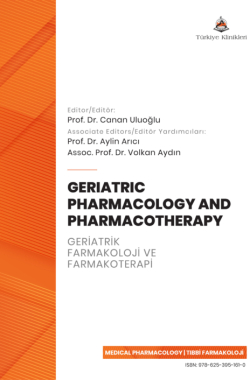Antineoplastic Pharmacotherapy in the Elderly
Hüseyin Salih SEMİZa , Mukaddes GÜMÜŞTEKİNb
aDokuz Eylül University Oncology Institute, Department of Preventive Oncology, İzmir, Türkiye
bDokuz Eylül University Faculty of Medicine, Department of Medical Pharmacology, Division of Clinical Pharmacology, İzmir, Türkiye
Semiz HS, Gümüştekin M. Antineoplastic pharmacotherapy in the elderly. In: Uluoğlu C, ed. Geriatric Pharmacology and Pharmacotherapy. 1st ed. Ankara: Türkiye Klinikleri; 2023. p.110-5.
ABSTRACT
In our world where the population is getting older, cancer is an increasingly important public health problem. Considering the fact that more than half of all cancers occur in patients aged 65 years and older, it is obvious that physicians will encounter an increasing number of elderly cancer patients. Increasing comorbidities with aging, increasing rates of drug use and some physiological changes reveal the need for treatment of elderly cancer patients by experienced multidisciplinary teams. It has become unacceptable to depend only on chronological age when deciding on systemic treatment in elderly cancer patients. Many parameters such as comorbidities, performance score, life expectancy, patient expectations, treatment benefit, potential harms related to treatment should be considered in detail and dynamically before, during and after systemic treatment of elderly cancer patients. Another important issue to be considered is polypharmacy. It should not be forgotten that polypharmacy may have lifethreatening consequences. These detailed evaluations should be carried out in the light of international guidelines and with the support of a multidisciplinary team.
Keywords: Cancer; antineoplastic agents; elderly
Kaynak Göster
Referanslar
- Siegel RL, Miller KD, Wagle NS, Jemal A. Cancer statistics, 2023. CA Cancer J Clin. 2023;73(1):17-48. [Crossref] [PubMed]
- Schrijvers D. ESMO Handbook on Cancer in the Senior Patient 2nd ed. Switzerland: ESMO; Chapter 02: Cancer Epidemiology. 2015. p.7-10.
- Viale PH. The American Cancer Society's Facts & Figures: 2020 Edition. J Adv Pract Oncol. 2020;11(2):135-6. [Crossref] [PubMed] [PMC]
- Williams GR, Mackenzie A, Magnuson A, Olin R, Chapman A, Mohile S, et al. Comorbidity in older adults with cancer. J Geriatr Oncol. 2016;7(4):249-57. [Crossref] [PubMed] [PMC]
- Fitzsimmons D, Gilbert J, Howse F, Young T, Arrarras JI, Brédart A, et al. A systematic review of the use and validation of health-related quality of life instruments in older cancer patients. Eur J Cancer. 2009;45(1):19-32. [Crossref] [PubMed]
- Healthy Aging: Helping People to Live Long and productive Lifes and enjoy Good Quality of Life. In Prevention CoDCa, eds. (cited: 25.08.2023). Avaliable at: [Link]
- Feliu J, Heredia-Soto V, Gironés R, Jiménez-Munarriz B, Saldaña J, Guillén-Ponce C, et al. Can we avoid the toxicity of chemotherapy in elderly cancer patients? Crit Rev Oncol Hematol. 2018;131:16-23. [Crossref] [PubMed]
- Ostwal V, Ramaswamy A, Bhargava P, Hatkhambkar T, Swami R, Rastogi S et al. Cancer Aging Research Group (CARG) score in older adults undergoing curative intent chemotherapy: a prospective cohort study. BMJ Open. 2021;1(6):e047376. [Crossref] [PubMed] [PMC]
- Laack E, Bokemeyer C, Hossfeld DK. Adjuvant chemotherapy after complete resection of non-small cell lung cancer. Dtsch Arztebl Int. 2008;105(14):249-54. [Crossref] [PubMed]
- Falandry C, List A, Balducci L. Cell cycle arrest: A breakthrough in the supportive care of older cancer patients. J Am Geriatr Soc. 2023;71(7):2297-307. [Crossref] [PubMed]
- Nie X, Liu D, Li Q, Bai C. Predicting chemotherapy toxicity in older adults with lung cancer. J Geriatr Oncol. 2013;4(4):334-9. [Crossref] [PubMed]
- Le Saux O, Falandry C. Toxicity of Cancer Therapies in Older Patients. Curr Oncol Rep. 2018;20(8):64. [Crossref] [PubMed]
- Mangoni AA, Jackson SH. Age-related changes in pharmacokinetics and pharmacodynamics: basic principles and practical applications. Br J Clin Pharmacol. 2004;57(1):6-14. [Crossref] [PubMed] [PMC]
- John V, Mashru S, Lichtman S. Pharmacological factors influencing anticancer drug selection in the elderly. Drugs Aging. 2003;20(10):737-59. [Crossref] [PubMed]
- Wildiers H, Highley MS, de Bruijn EA, van Oosterom AT. Pharmacology of anticancer drugs in the elderly population. Clin Pharmacokinet. 2003;42(14):1213-42. [Crossref] [PubMed]
- Shafiei M, Galettis P, Beale P, Reuter SE, Martin JH, McLachlan AJ, et al. Influence of age on pharmacokinetics of capecitabine and its metabolites in older adults with cancer: a pilot study. Cancer Chemother Pharmacol. 2023;92(2):135-9. [Crossref] [PubMed]
- Konstandi M, Johnson EO. Age-related modifications in CYP-dependent drug metabolism: role of stress. Front Endocrinol (Lausanne). 2023; 4:1143835. [Crossref] [PubMed] [PMC]
- Lichtman SM, Wildiers H, Launay-Vacher V, Steer C, Chatelut E, Aapro M. International Society of Geriatric Oncology (SIOG) recommendations for the adjustment of dosing in elderly cancer patients with renal insufficiency. Eur J Cancer. 2007;43(1):14-34. [Crossref] [PubMed]
- Balducci, Lodovico. "Cancer in the elderly: biology, prevention, and treatment." Abeloff's clinical oncology. Churchill Livingstone, 2014. p. 904-13. [Crossref]
- Syed BM, Green AR, Rakha EA, Morgan DAL, Ellis IO, Cheung KL. Age-Related Biology of Early-Stage Operable Breast Cancer and Its Impact on Clinical Outcome. Cancers (Basel). 2021;13(6):1417. [Crossref] [PubMed] [PMC]
- Wildiers H, de Glas NA. Anticancer drugs are not well tolerated in all older patients with cancer. Lancet Healthy Longev. 2020;1(1):e43-e47. [Crossref] [PubMed]
- Hurria A, Browner IS, Cohen HJ, Denlinger CS, deShazo M, Extermann M, et al. Senior adult oncology. J Natl Compr Canc Netw. 2012;10(2):162-209. [Crossref] [PubMed] [PMC]

